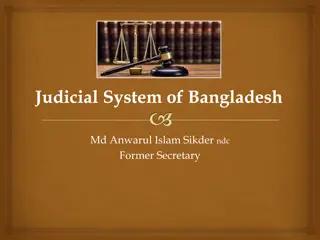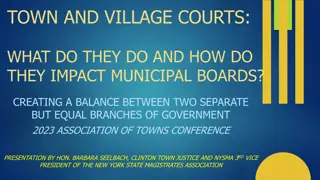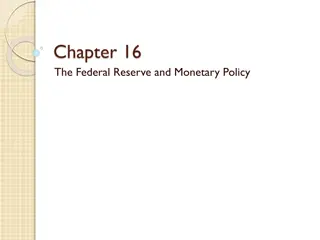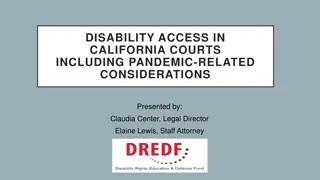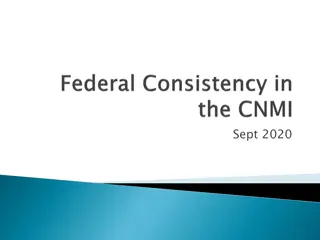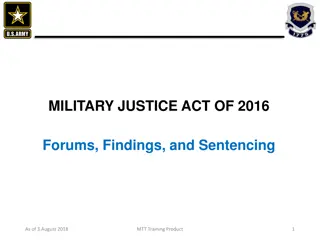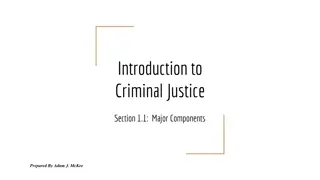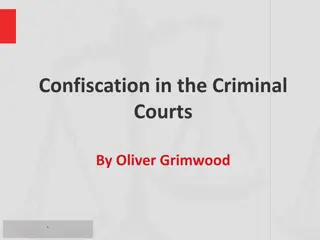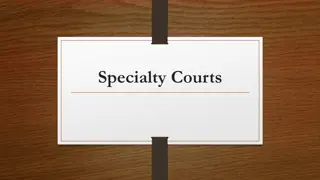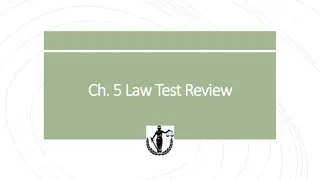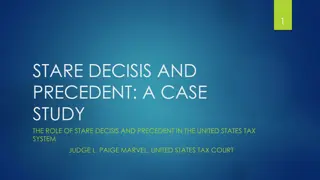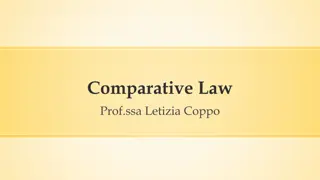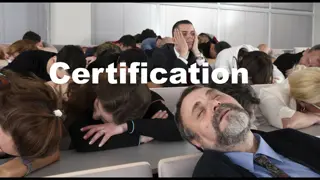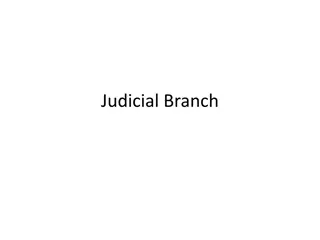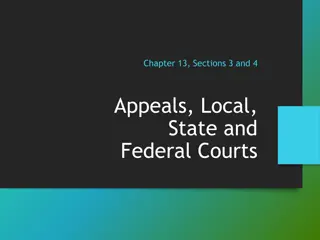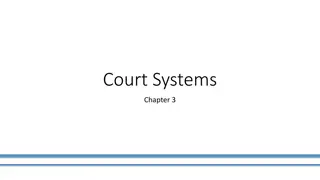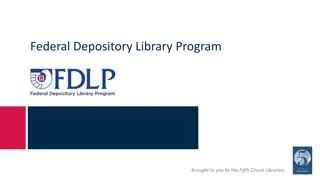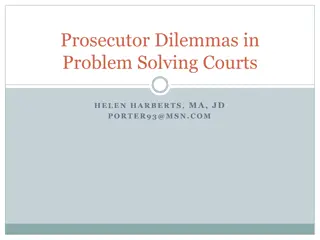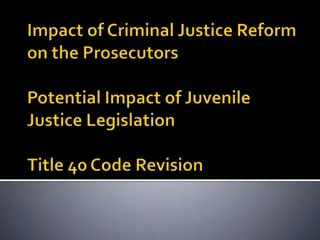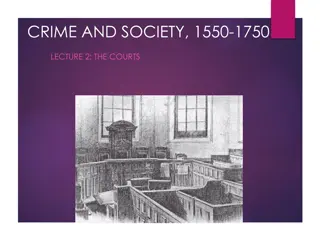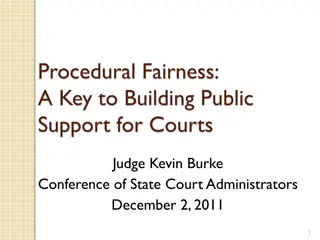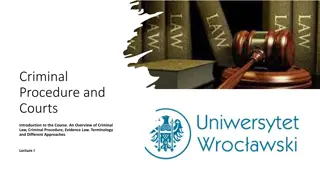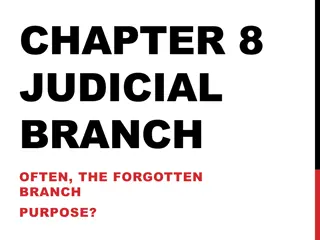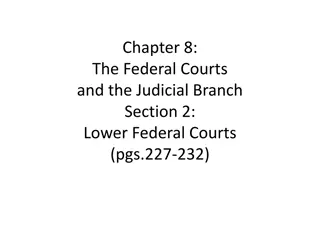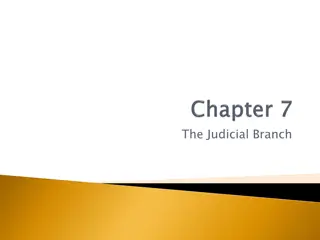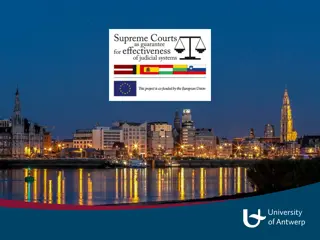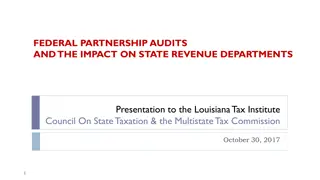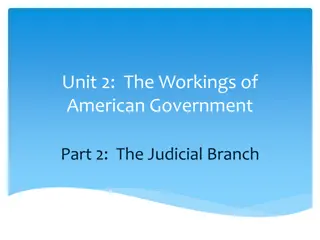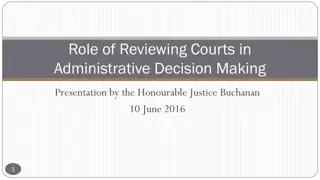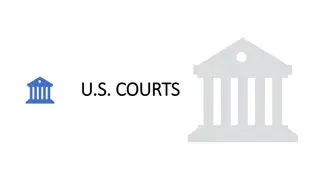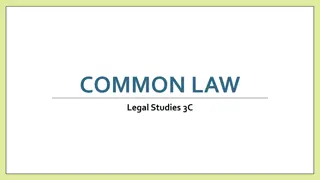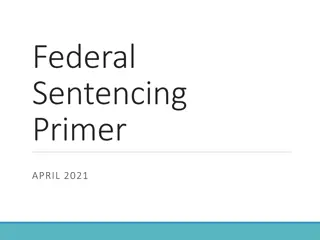Understanding the Judicial System of Bangladesh
The judicial system of Bangladesh is diverse, consisting of the Supreme Court, civil and criminal courts, courts of special jurisdiction, and more. The Constitution plays a vital role, outlining the structure and functions of the courts. From the Supreme Court to subordinate courts and tribunals, th
1 views • 37 slides
JUDICIAL REVIEW OF NATIONAL ACTION BY UNCLOS COURTS AND TRIBUNALS
International judicial review involves oversight by international courts and tribunals over the actions of States Parties in implementing their international commitments. UNCLOS courts exercise supervisory jurisdiction through grounds of review like due regard, reasonableness, necessity, and proport
1 views • 7 slides
Understanding the Role of Town and Village Courts in Municipal Governance
Explore the historical significance and impact of Town and Village Courts on municipal boards, focusing on the balance between branches of government, the importance of Justice Courts to constituents, and tips for enhancing relationships between municipalities and justice courts.
0 views • 46 slides
Understanding the Federal Reserve System and Monetary Policy
Delve into the history, structure, and functions of the Federal Reserve System, including its role in implementing monetary policy to stabilize the economy. Explore the establishment of the Federal Reserve Act of 1913, the structure of the Federal Reserve, and its pivotal role in serving the governm
0 views • 35 slides
Disability Access in California Courts: Pandemic Considerations and Legal History
This presentation on disability access in California courts, including pandemic-related considerations, covers relevant laws like Title II of the ADA and Section 504, historical developments such as the ADA enactment, and rules ensuring non-discrimination and accessibility in court proceedings. It a
0 views • 30 slides
Understanding Federal Consistency in Coastal Zone Management
This presentation serves as an introduction to Federal Consistency in the context of Coastal Zone Management, emphasizing the importance of compliance with enforceable policies outlined in the Coastal Zone Management Act. It highlights the role of the Division of Coastal Resources Management (DCRM)
1 views • 13 slides
Understanding Ethics, Confidentiality, and HIPAA in Drug Treatment Courts
Explore the importance of ethics, confidentiality, and HIPAA regulations in drug treatment courts. Learn about the laws such as 42 CFR Part 2 and HIPAA that protect the privacy of patient records. Discover who is covered by these laws and the entities that receive federal assistance. Gain insights i
0 views • 43 slides
Ensuring Quality in Legal Translation by 3 Parties: Governments, Courts, and Translators
Explore the importance of quality legal translation involving governments, courts, and translators in criminal proceedings. The European Union's Directive on interpretation and translation aims to facilitate communication across Member States. Governments play a key role in regulating the translatio
0 views • 20 slides
Overview of Military Justice Act of 2016 and Court-Martial Proceedings
This comprehensive overview covers the Military Justice Act of 2016 and various aspects of court-martial proceedings, including different types of courts-martial, required votes for findings and sentencing, changes in special court-martial procedures, and more. The content delves into the specific c
0 views • 44 slides
Overview of Criminal Justice System Components in the United States
The criminal justice system in the United States comprises various systems at state and federal levels. It consists of major components - Police, Courts, Corrections - bound by the Rule of Law and the Constitution. The Courts interpret laws and uphold civil liberties, with remedies available for vio
0 views • 28 slides
Confiscation in the Criminal Courts: A Guide to Proceeds of Crime Law
Confiscation in the criminal courts involves depriving defendants of benefits gained from criminal conduct within their means. The Proceeds of Crime Law in the Cayman Islands sets guidelines for these proceedings, emphasizing that confiscation is not a form of punishment but aims to recover obtained
3 views • 17 slides
Cultural Awareness for Drug Courts Working with Native American Participants
Understanding the cultural nuances of Native American communities is crucial for Drug Courts collaborating with Tribal Healing to Wellness Courts. This involves acknowledging tribal sovereignty, regional and cultural differences, customs, spirituality, and communication styles unique to American Ind
0 views • 22 slides
Specialty Courts and Recidivism Rates in the United States
Specialty Courts, such as Drug Courts and Problem-Solving Courts, provide intensive behavioral supervision and treatment for substance abuse and mental health issues. These courts aim to reduce recidivism rates and engage criminal offenders in therapeutic interventions. Nevada is actively running 42
1 views • 14 slides
Understanding Jurisdiction and Court Systems: Law Test Review
Explore the concept of jurisdiction in the legal system, from the powers of courts to the different types of courts like admiralty and appellate courts. Learn about the structure of the federal courts in the U.S. and the functions of the Supreme Court. Gain insights into the specialized jurisdiction
2 views • 41 slides
The Role of Stare Decisis and Precedent in the U.S. Tax System
The United States tax system relies on the principles of stare decisis and precedent to ensure consistency and fairness. The Constitution grants Congress the power to levy taxes with specific limitations. Federal courts play a crucial role in interpreting tax laws and resolving disputes, with a stru
1 views • 17 slides
Understanding the Judicial Branch of the Federal Government
The Judicial Branch, as the third branch of the federal government, ensures fair law enforcement and interprets laws through criminal and civil cases. Federal courts were established to address issues of state-based justice disparities. The judiciary system comprises district courts for trials, circ
1 views • 34 slides
Understanding the Federal System in American Law
The American legal system is rooted in a division of powers between the States and the Federal government. Federal law fills gaps and complements State laws, with Federal courts having jurisdiction over disputes involving different States or Federal issues. The Constitution and Bill of Rights protec
0 views • 23 slides
Understanding Certification of Legal Questions in the Judicial Process
Certification of legal questions involves process where courts seek clarification or confirmation on legal matters through higher authorities. This includes certification steps in federal and state courts, the role of parties, judges, and justices, and the final resolution of certified questions. Th
0 views • 12 slides
US-China Relations in the Trump Administration: Unilateral Presidential Actions and Congressional Dynamics
The article discusses the evolving US-China political and economic relations during the Trump administration, focusing on unilateral presidential actions, Congress's role, and the influence of the federal courts. It highlights President Trump's aggressive trade agenda, challenges to his reliance on
0 views • 24 slides
Insights into the American Judicial Branch
The American judicial system involves various types of courts with distinct roles and jurisdictions. From trial courts to the Supreme Court, each plays a crucial part in interpreting and applying the law. Key aspects such as standing to sue, class action suits, federal court constraints, and court j
0 views • 58 slides
Exploring Appeals and Court Systems: Chapter 13 Overview
This educational content delves into the intricacies of appeals in the legal system, covering characteristics of successful appeals, procedures at appeals courts, the role of precedent, jurisdiction determination, and an overview of federal, state, and local court structures. The material also discu
0 views • 24 slides
Overview of Court Systems and Dispute Resolution Methods
Explore the functioning of court systems, forms of dispute resolution, enforceability of arbitration terms, and the role of courts in settling disputes. Learn about trial and appellate courts, federal court system, and the need for Constitutional amendments in the legal context.
0 views • 33 slides
Federal Depository Library Program: Providing Access to Government Information
The Federal Depository Library Program (FDLP) offers free government materials to libraries, ensuring public access to federal information. Established in 1813, the program disseminates resources across 1150 federal libraries, promoting transparency and accountability. Selective depository libraries
0 views • 20 slides
Challenges and Innovations in Problem-Solving Courts
Helen Harberts, a skilled MA and JD with expertise in problem-solving courts, delves into the dilemmas faced by prosecutors in these courts. Through in-depth insights and thought-provoking questions, the narrative explores the effectiveness of traditional responses to addiction-based offenses, publi
0 views • 65 slides
Impact of Criminal Justice Reforms on State Courts and Prosecutors
Changes in crime classifications and sentencing laws, along with the emphasis on Accountability Courts, are reshaping the criminal justice landscape in the state. Key changes include alterations to theft, burglary, and controlled substance laws, impacting the workload of state courts and prosecutors
0 views • 20 slides
Virtual Town Hall Monroe County Problem-Solving Courts: Stories and Statistics
Explore the Virtual Town Hall hosted by Viterbo University VOICE Initiative and Monroe County, focusing on Problem-Solving Courts. Learn about the initiatives, perspectives, and impacts of Drug Treatment Court, OWI Treatment Court, and Family Reunification Court. Gain insights from key figures like
0 views • 23 slides
Crime and Society, 1550-1750: Courts and Legal System Overview
The lecture covers the courts and legal system during the period of 1550-1750, focusing on the role of the monarch, Parliament, King's Bench, Court of Common Pleas, Assizes, Old Bailey, and local courts like Quarter Sessions. It highlights the hierarchy and functions of different courts in dealing w
0 views • 19 slides
Understanding Public Perceptions of Courts and Judges
Exploring public opinions on procedural fairness in courts, this content discusses the influence of judges' political views, aspirations for higher courts on their impartiality, and the divided nation on interpreting the Constitution. It also highlights the complexities of public knowledge about the
0 views • 24 slides
Introduction to Criminal Procedure and Courts: Overview and Terminology
This piece provides an introduction to a course on Criminal Procedure and Courts, covering topics such as criminal law, evidence, courts, and international legal bodies. It outlines the exam format, information on lecturers, and essential knowledge needed for the course. Additionally, it shares insi
0 views • 28 slides
Understanding the Judicial Branch of the United States
The Judicial Branch, often overlooked, plays a crucial role in interpreting and applying laws fairly. It was established under Article 3 of the Constitution with the dual system separating state and federal courts. The Judiciary Act of 1789 proposed a three-tiered court system, including District Co
0 views • 31 slides
Understanding the Federal Court System in the United States
The Federal Court system in the United States comprises District Courts, handling a vast number of cases each year, with each district having multiple judges. These courts have jurisdiction over a range of cases, including civil rights violations, employment disputes, criminal offenses, and bankrupt
0 views • 11 slides
Understanding the Judicial Branch in the United States
The judicial branch in the U.S. encompasses a dual court system with different types of jurisdictions, including exclusive and concurrent jurisdiction. Courts settle both criminal and civil cases, ensuring fair enforcement of laws and interpreting them justly. Civil cases resolve disputes between pr
0 views • 39 slides
Role of Supreme Courts in Ensuring Effective Judicial Systems in the European Union
This communication focuses on the vital role of Supreme Courts in guaranteeing the effectiveness of judicial systems within the European Union. It delves into the significance of courts' communication strategies, emphasizing accessibility of justice, trust-building, and public image. The discussion
0 views • 29 slides
Understanding Federal Partnership Audits and Their Impact on State Revenue Departments
The presentation discusses the impact of federal partnership audits on state revenue departments, emphasizing how states benefit from federal audit efforts. It covers topics such as reporting federal audit adjustments, the background of federal audit adjustments, and the final determination process.
0 views • 51 slides
Overview of Courts and Legal System in Greece
The legal system in Greece is structured around ordinary and special courts, with judicial power vested in the courts of law. The system includes ordinary civil, criminal, and administrative courts, along with special courts for specific cases. The three jurisdictions - civil, criminal, and administ
0 views • 22 slides
The American Judicial Branch: Structure and Judicial Review
The American judicial system consists of District Courts, Appellate Courts, and the Supreme Court. District Courts handle initial cases, Appellate Courts hear appeals, and the Supreme Court is the highest authority. Justices are nominated by the President and confirmed by the Senate. Judicial review
0 views • 12 slides
Role of Reviewing Courts in Administrative Decision Making Presentation
The presentation by the Honourable Justice Buchanan on the role of reviewing courts in administrative decision-making highlights key legal cases and principles. It explores the delicate balance between judicial review and administrative decision-makers' discretion, emphasizing the importance of proc
1 views • 38 slides
Understanding the U.S. Court System: Jurisprudence and Structure
Law enforcement officers play a crucial role in the criminal justice system by understanding criminal jurisprudence and the court system's structure. This includes knowledge of different court levels, jurisdiction, and the adjudication process. The duality of courts, such as adult vs. juvenile court
0 views • 43 slides
Overview of Legal System in Australia
This content covers various aspects of the legal system in Australia, including common law, sources of law, court hierarchy, appeals process, federal courts, and the importance of judicial independence. It outlines the key components of the legal framework, such as the role of Parliament, judge-made
0 views • 36 slides
Understanding Federal Sentencing Principles
Federal sentencing is determined by various factors including the applicable sentencing statute, statutory maximum and minimum terms of imprisonment, fines, supervised release terms, special assessments, the U.S. Sentencing Commission Guidelines Manual, judicial discretion, and factors outlined in 1
0 views • 26 slides
